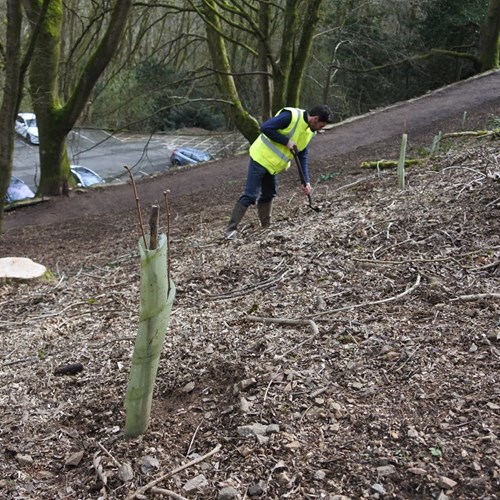Shrubs and small trees have been planted on the lower slopes of British Camp following the removal of ash trees infected with ash dieback disease.
This winter a large number of ash trees adjacent to the popular car park were removed for public safety. Forty new shrubs have been planted in the gaps created by the felling to improve the site for local wildlife.
Ash dieback, which was first identified in the UK in 2012, has spread across the country and causes the wilting of leaves, shoots to die back and often the death of the tree. Infected trees can be found across the Trust’s estate and tree management works are undertaken each winter for safety.
Beck Baker, Community and Conservation Officer said: “Sadly, ash dieback had been found in a number of the trees around the very popular British Camp car park. An infection from this fungus causes the decline of trees and, in 80 per cent of cases, the death of infected ash trees. For public safety we removed the most severely infected trees at this popular visitor location.”
Infected ash trees can become brittle increasing the likelihood of failure, so the removal of severely infected trees near to highways and properties is essential. It is believed that a small percentage of ash trees may be tolerant to the disease and ash trees on the Trust’s estate that show little or no signs of disease will be left and monitored.
This part of the Malvern Hills is home to a host of native wildlife including a number of bat species for which the woodland habitats are essential for roosting, feeding and moving through the landscape. The new planting of hazel, guelder rose, alder buckthorn and dog wood shrubs here will increase diversity within the woodland providing food and shelter for local species.
Small open areas created by the felling has also increased the amount of light reaching the woodland floor, and the Trust hopes this will encourage woodland flora such as bluebells and wood anemone to bloom in future years.
The roots of the new shrubs will also help to stabilise the bank and the plants will slow water run-off from the hill into the car park.
The Trust is facing a significant ongoing cost in dealing with additional tree safety works resulting from ash dieback disease. You can support the Trust’s response to the devastating impacts of ash dieback disease via Just Giving.

